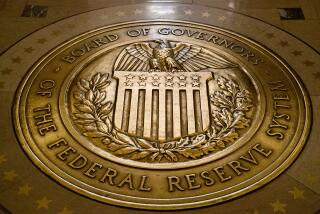Greenspan Vows Independence in Federal Reserve Board Post : Reagan Nominee Says He’d Resist Political Pressure
- Share via
WASHINGTON — Alan Greenspan, President Reagan’s nominee to take over the Federal Reserve Board from departing Chairman Paul A. Volcker, promised today that the post would remain politically independent, especially during an election year.
“It is conceivable that my actions could be wrong but it will not be because of politics,” Greenspan told the Senate Banking Committee.
Some senators suggested that the Reagan Administration will be even more concerned about monetary policy during 1988, which will be a presidential election year.
But Greenspan said that he does not expect any political pressures on the central bank’s policy from the Administration and that, if any overture along these lines were made, “I obviously would reject it.”
He added later, “I would absolutely resist them.”
Would Continue Hard Line
Some critics of Greenspan’s nomination have said he would be unable to resist Administration pressure to keep interest rates low in order to spur economic growth, even if it risked higher inflation. The Fed’s main job is to set targets for money supply growth, which is done by pushing interest rates higher or lower.
Greenspan said he would continue the tough anti-inflationary monetary policies of Volcker, who is scheduled to leave Aug. 6.
“I would say that the type of policies that Chairman Volcker has initiated are, as I said previously, essentially on target,” Greenspan said.
Volcker, in parting testimony today after eight years at the helm of the Federal Reserve Board, told the House Banking Committee on the other side of Capitol Hill that recent encouraging economic signs mean that the Fed plans no major changes in monetary policy.
He also said Greenspan will have “challenge aplenty” in the years to come.
‘Risks and Problems’
“It would be nonsense for me to claim that all is safely and securely on path. The remaining risks and problems are apparent,” Volcker said.
Later, in response to questions, Volcker said the economy is in a critical period in its dealing with inflation.
“It is much harder to deal with inflation once it has some momentum,” Volcker said. “The lesson is to deal with it before it achieves momentum, and I think we’re in a rather critical period right now where we have inflation going up, predictably, because of the changes in the oil situation and because of the dollar.”
But, he added, “I think we have a chance that it will subside again, and should subside again relatively soon if we can maintain restraint on the cost and wage front” and preserve productivity.
Volcker told the lawmakers that the “evidence by now is pretty clear that, in real terms, our trade balance is improving.”
The timing of Greenspan’s and Volcker’s appearances in Congress was coincidental.
More to Read
Sign up for Essential California
The most important California stories and recommendations in your inbox every morning.
You may occasionally receive promotional content from the Los Angeles Times.










